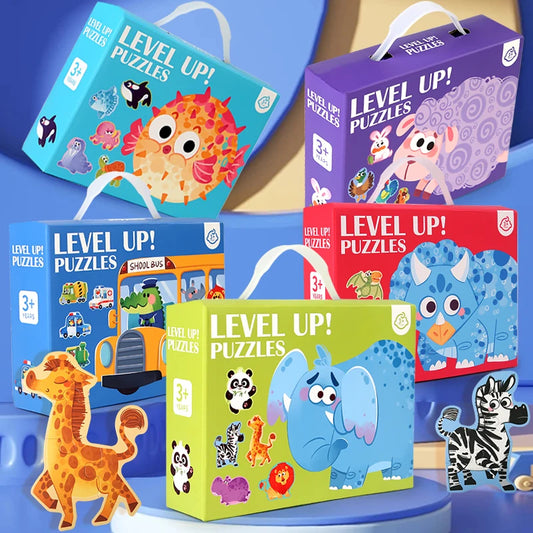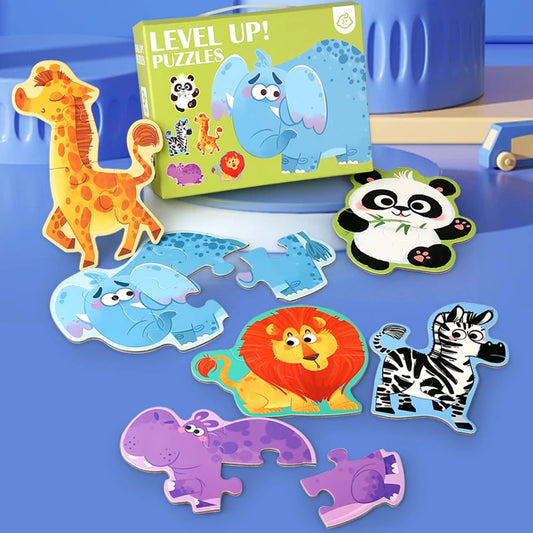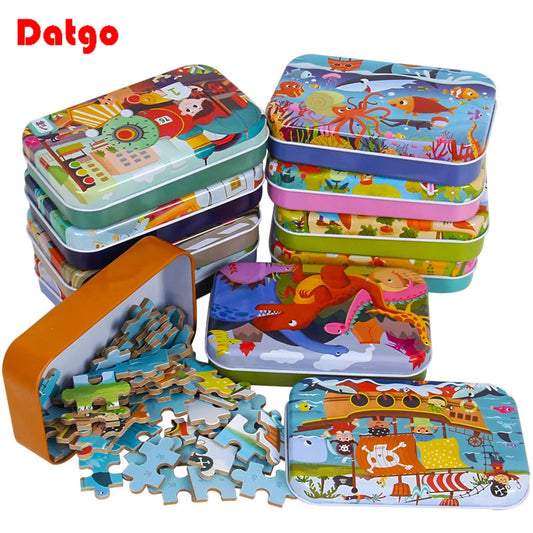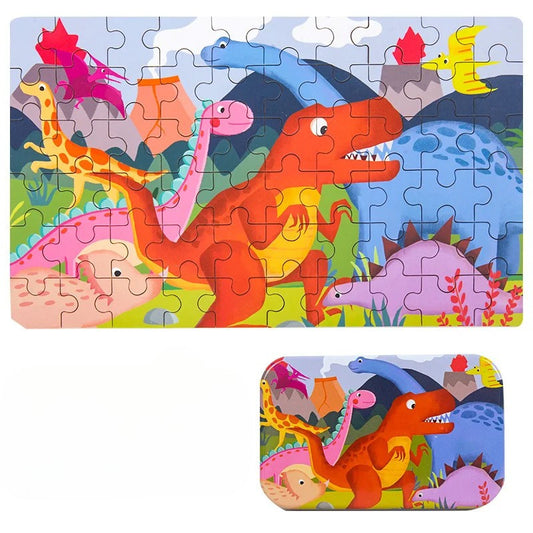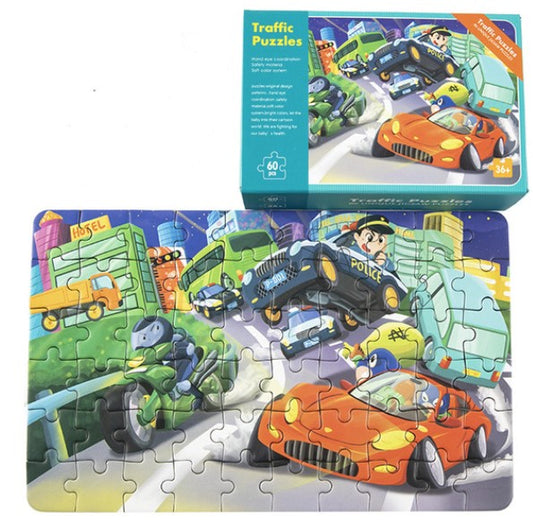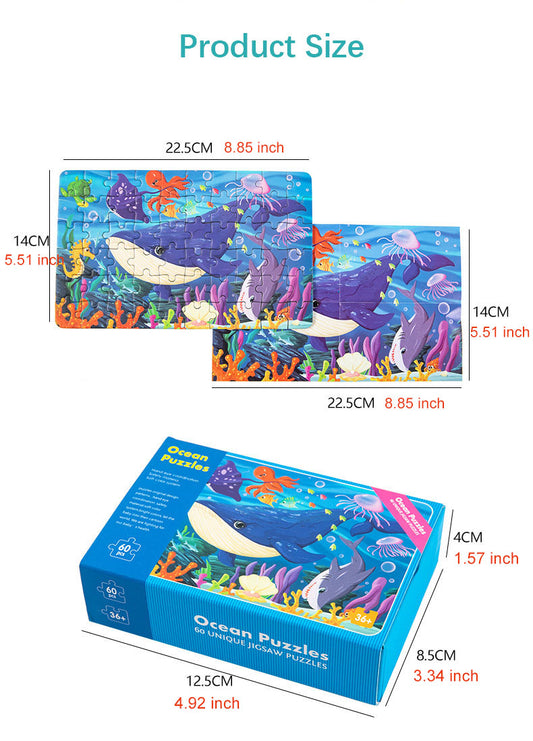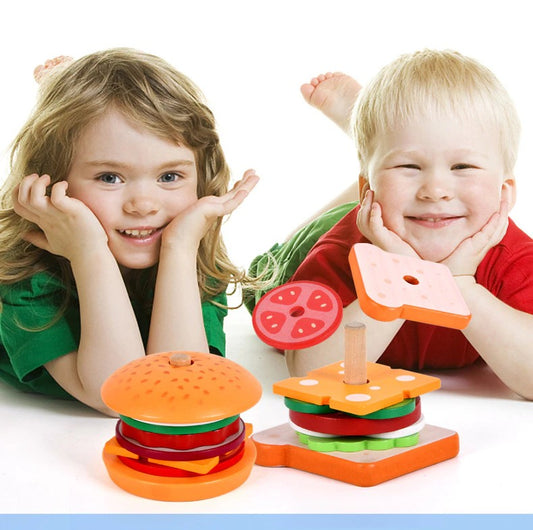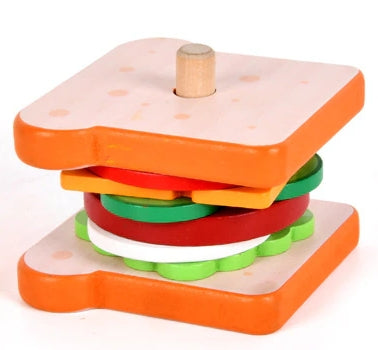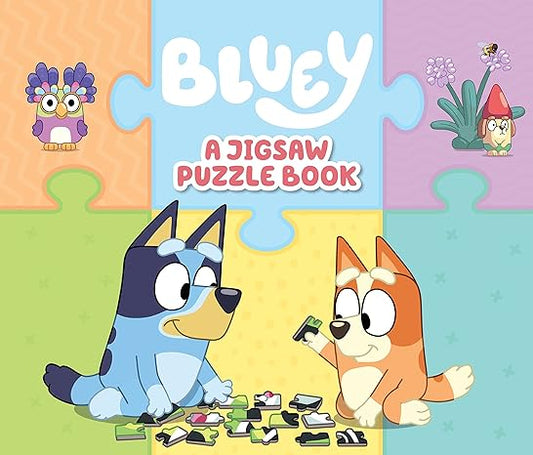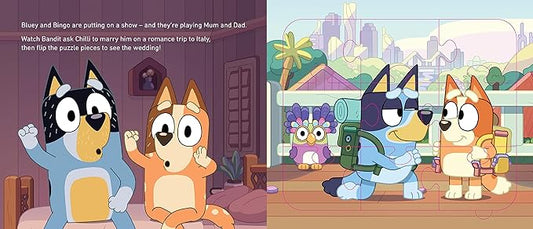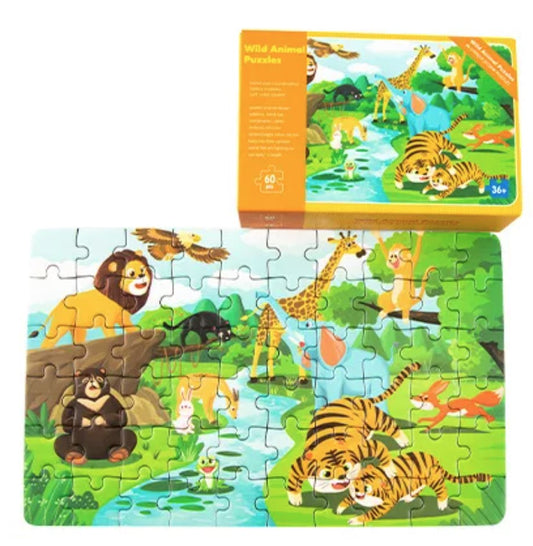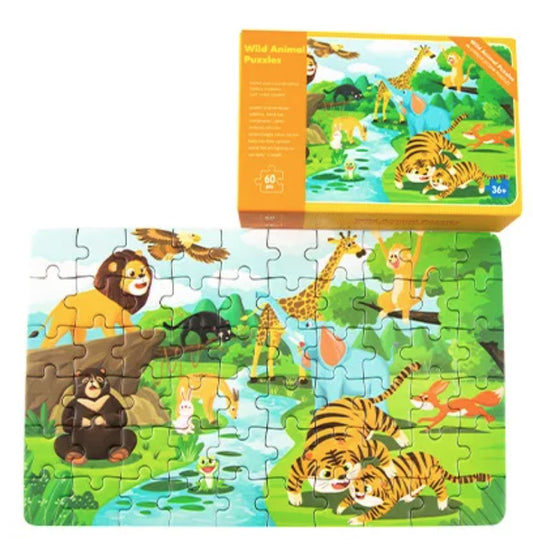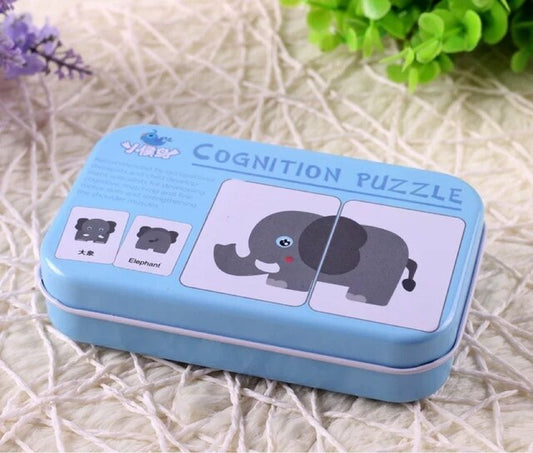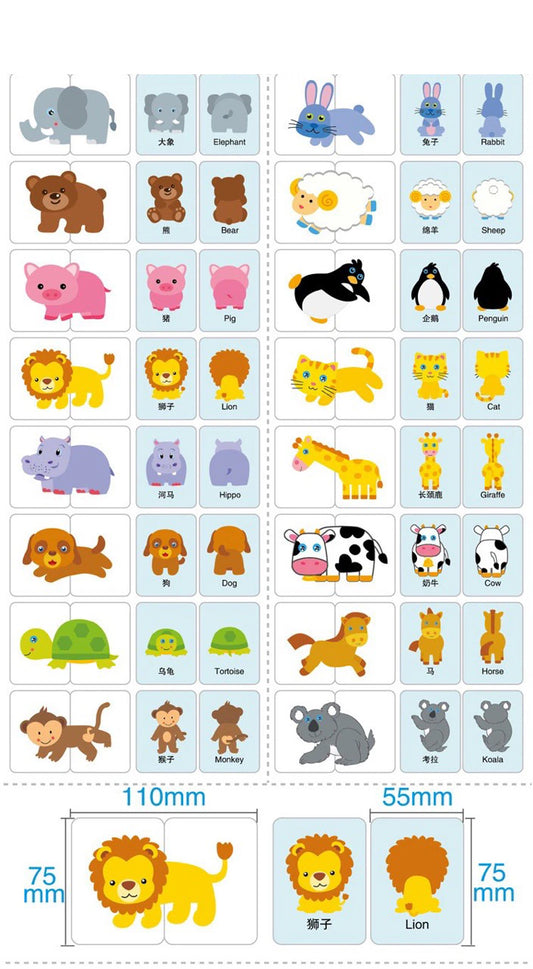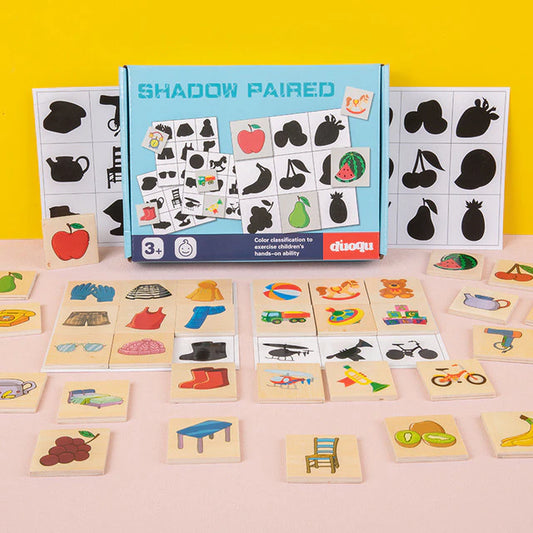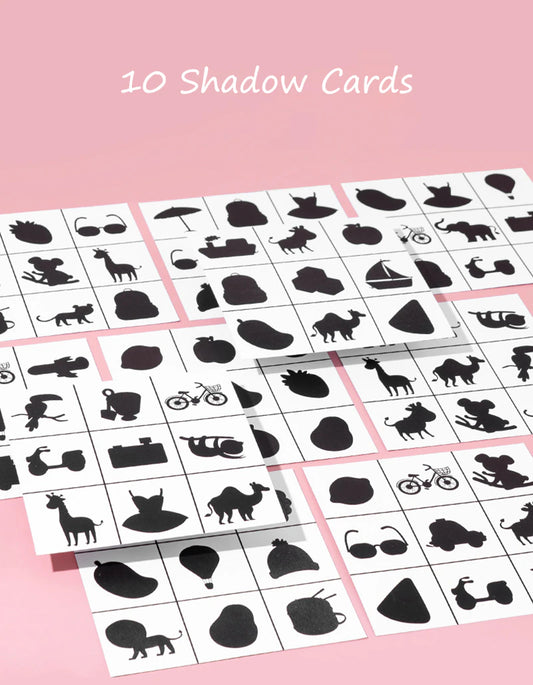Collection: Puzzles
-
Level Up! Puzzle (3 to 6 years)
Regular price A$19.90Regular price -
60-Piece Dinosaur Puzzle (4 to 8 years)
Regular price A$9.90Regular price -
Traffic Jigsaw Puzzle - 60 Pieces (3 to 8 years)
Regular price A$12.90Regular price -
Wooden Montessori Stackable Sandwich Simulation Game
Regular price A$19.90Regular price -
Bluey - A Jigsaw Puzzle Book: 4 Double-sided Puzzles Hardcover – Picture Book (3-5 years)
Regular price A$19.90Regular price -
Wild Animal Jigsaw Puzzle - 60 Pieces (3 to 8 years)
Regular price A$12.90Regular price -
Montessori Animal Cognition Puzzle Set
Regular price A$14.90Regular price -
Wooden Montessori Shadow Matching Puzzle with Fruits (3+ years)
Regular price A$29.90Regular price
Top Montessori Toys for Engaging Toddlers at Home and On The Go
What makes Montessori toys the ideal choice for your toddler’s development? These toys promote self-learning and encourage fine motor skills, cognitive growth, and sensory exploration. In this article, we unveil our top picks for Montessori toys and delve into how each contributes to your child’s learning journey.
Key Takeaways
- Montessori toys are specifically designed to meet the developmental needs of children, promoting individual learning speeds and styles while focusing on age-appropriate, self-directed educational experiences.
- These toys prioritise simplicity, hands-on engagement, problem-solving, and independence, allowing children to learn through play in a safe and durable environment without electronic distractions.
- Incorporating Montessori toys into daily play enhances children’s cognitive, motor skill, and sensory development while fostering creativity, independence, and lifelong learning.
The Montessori Method and Its Importance
The Montessori Method, pioneered by Maria Montessori, revolutionized early childhood education by focusing on the individual child’s natural learning tendencies. By observing children’s innate processes, Montessori designed an educational approach that aligns with each child’s unique style, developmental stage, and interests. This method empowers children, giving them the reins to direct their own educational journey, acknowledging that each child learns at their own pace and in their own way.
Beyond academic learning, the Montessori Method embraces a holistic view of education as a vital tool for life. The curriculum spans:
- Practical Life
- Sensorial experiences
- Language
- Mathematics
- Cultural Studies
This ensures a comprehensive child’s learning journey for every young learner. This method lays the groundwork for children to become active, engaged participants in their own education and life.
Key Characteristics of Montessori Toys
Montessori toys are far more than mere playthings; they are integral components of a ‘prepared environment’ designed to meet the developmental needs of children. These educational toys are simple by design, fostering concentration and a meaningful connection between the child and their play.
Let’s delve into the characteristics that make these toys stand out on a child’s learning journey, as highlighted in various reviews.
Age-Appropriate Design
The beauty of Montessori toys lies in their ability to cater to specific age groups. Each toy is designed to meet children right where they are in their developmental journey, providing the right level of challenge to encourage growth. These toys are not just about play but about hitting developmental milestones, whether fine-tuning motor skills, sparking cognitive growth, or igniting sensory exploration.
As children grow, Montessori toys adapt to their evolving needs, presenting age-appropriate challenges that foster continuous development. It’s about introducing simple yet effective toys that resonate with the stages children are currently experiencing, supporting their journey towards greater complexity and understanding.
Safety and Durability
When it comes to children’s toys, safety and durability are paramount. Montessori toys often bring wood's natural beauty and safety into the play space, free from harmful chemicals and built to last. These toys are not just safe and sturdy; they’re also a testament to sustainability, crafted from materials that can be handed down through generations and enrich multiple childhoods.
Moreover, ensuring these toys meet safety standards such as ASTM F963 and EN71 means that parents can rest easy, knowing their children are engaging with toys that are as safe as they are educational. These toys are designed to withstand the rigours of play, ready to be dropped, stacked, and explored without missing a beat.
Encouraging Independence and Problem Solving
Montessori toys are a powerful vehicle for cultivating independent thinking and problem-solving skills. With self-correcting designs, these educational toys encourage children to:
- Identify and rectify their own mistakes
- Foster resilience and a can-do attitude
- Grasp educational concepts through repetition and practice
- Grow their independence with each success
The hands-on learning approach is central to the Montessori philosophy, allowing children to grasp educational concepts through repetition and practice, growing their independence with each success.
Open-ended play is another cornerstone of these toys, sparking imagination and offering limitless possibilities for exploration. As children interact with Montessori toys, they’re not just playing but learning to navigate the world, making decisions, and solving problems that will serve them well on their lifelong learning journey.
Top Montessori Toys for Toddlers
The right educational toys are crucial for enriching a toddler’s learning journey. With countless options available, it can be daunting to choose, but we’ve curated a list of the top Montessori toys that promise to captivate and educate your little ones.
These toys are thoughtfully designed to foster various developmental skills in children, ensuring that playtime is as productive as it is pleasurable.
Colour Matching and Sorting Games
Colour matching and sorting games are a fantastic way to introduce toddlers to the vibrant world of colours, enhancing their cognitive abilities and problem-solving skills. Toys such as the Colour Sorting Koala and Wooden Montessori Toys provide a fun and interactive way for children to grasp the concept of matching and sorting, which are foundational skills in early education.
These games go beyond simple recognition; they challenge toddlers to think critically and develop hand-eye coordination, fine motor skills, and visual perception. By incorporating these educational toys into play, children learn to categorize objects, a skill that translates into numerous cognitive benefits.
Fine Motor Skill Development
Developing fine motor skills is an essential part of a child’s growth, and Montessori toys such as wooden stacking blocks and object permanence boxes are specifically designed to aid in this process. These toys encourage little hands to engage in activities that require precision, such as grasping, pinching, and twisting, which are critical for cognitive and physical development.
Moreover, toys like musical instruments and child-safe scissors provide a fun and educational way for toddlers to further enhance their fine motor abilities. By engaging with these toys, children not only improve their dexterity and coordination but also lay the groundwork for future learning, such as writing and other complex tasks.
Sensory Exploration
Sensory exploration is a key component of the Montessori philosophy, and toys like Busy Boards and coin drop toys are designed to stimulate a child’s senses, contributing to cognitive growth and a deeper understanding of the world. These toys incorporate various textures, sounds, and visual elements, captivating children’s attention and encouraging them to explore their environment.
From the soft crinkle of a toy to the bright colours of a Busy Board, Montessori toys offer many sensory experiences that entertain and educate. They provide a safe and engaging way for children to discover the diverse stimuli around them, building a foundation for lifelong learning and creativity.
Benefits of Montessori Toys for Children
Montessori toys offer a range of benefits that extend well beyond the playroom. They support the development of:
- Practical life skills, fostering independence and self-care
- Fine and gross motor skills contributing to a child’s physical development and coordination
- Language acquisition and cultural awareness, laying the foundation for a well-rounded education
These educational toys provide a holistic approach to child development.
The imaginative play encouraged by Montessori toys also plays a crucial role in a child’s emotional and social development. By engaging in pretend play, children:
- Exercise their creativity
- Learn to navigate social dynamics
- Gain confidence and a sense of accomplishment that will stay with them throughout their lives.
How to Choose the Right Montessori Toy
Choosing the right Montessori toy for your child can be a delightful yet challenging task. To ensure a fruitful learning experience, it’s important to consider the child’s developmental stage and individual interests. By selecting toys that align with their current needs, you provide them with challenges that match their abilities and encourage their natural curiosity.
A personalized selection of Montessori toys offers the following benefits:
- Enhances the child’s learning experience
- Ensures that the toys remain engaging and relevant over time
- Promotes a deeper connection between the child and their educational journey
- Fosters a love for learning that will blossom with each new discovery
Montessori Toys vs Traditional Toys
The differences between Montessori toys and traditional toys are subtle and significant. Montessori toys, devoid of batteries and electronic distractions, encourage active engagement and creativity, fostering a child’s learning journey in a more intentional manner. In contrast, traditional toys often offer a variety of materials and may prioritize entertainment over education.
While each type of toy has its place, the tactile experience and educational value offered by Montessori toys make them a unique and valuable addition to any child’s collection. However, it’s also important to recognize that traditional toys may be more suitable in certain situations, such as travel or when children need a break from structured learning.
How to Incorporate Montessori Toys into Daily Play
Incorporating Montessori toys into daily play is a delightful way to enrich your child’s day-to-day experiences. Allowing children the freedom to choose which toys to play with fosters independence and decision-making skills, creating an environment where they feel empowered and confident. Integrating toys that require active participation, such as those involving hands, legs, and sensory skills, ensures that children engage in a holistic development process.
Furthermore, including open-ended Montessori toys in routine play offers the following benefits:
- Encourages creativity
- Allows children to interact with the toys in a multitude of ways
- Offers children the opportunity to express themselves freely
- Allows children to explore the limitless potential of their imagination
This flexible approach to playtime can greatly enhance a child’s development across various ages, offering great deals for their growth as they watch and learn.
Summary
In conclusion, Montessori toys are transformative in a child’s learning journey, offering a unique blend of fun, education, and development. By understanding the Montessori Method and the key characteristics of these toys, parents can make informed choices that foster their child’s growth and independence. As we’ve explored the top Montessori toys for toddlers, it’s clear that these tools are not just about play—they’re about building a foundation for a lifetime of curiosity, creativity, and love for learning.
Frequently Asked Questions
What is considered a Montessori toy?
Montessori toys are considered to be those made from natural materials like wood, metal, cotton, and glass. These materials inspire a connection to nature and the real world, providing a sensory experience for exploration.
What is the difference between Montessori toys and regular toys?
The main difference between Montessori toys and regular toys is that Montessori toys are designed to encourage independent, skill-building play, while regular toys may present abstract lessons to children (2021).
Are Montessori toys necessary?
Yes, Montessori toys are necessary as they create a positive learning environment, allowing children to explore and develop essential social skills.
At what age should I introduce Montessori toys to my child?
You can introduce Montessori toys to your child at any age, as they are designed to cater to various developmental stages, from infancy to preschool years. It's important to choose toys that are appropriate for your child's specific age and developmental milestones.
Are Montessori toys only for use in Montessori schools?
No, Montessori toys are also suitable for use at home, offering children the chance for hands-on learning and development beyond the school setting.

